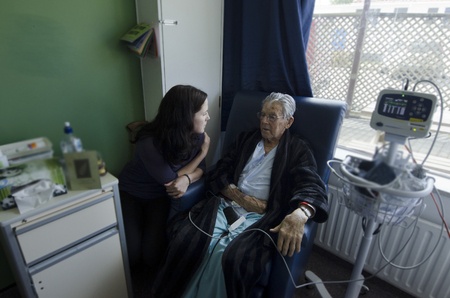

Although not all patients need the assistance of a social worker, some people do need help navigating through the healthcare system. Social workers in a healthcare facility often work with all types of patients. A great number of patients may have special needs, such as problems with addiction or homelessness.
Medical social workers often get a referral to see a patient from a physician, nurse, or discharge planner. Social workers then determine what psychological, social, or financial problems a patient is having due to his or her medical condition and provide assistance as needed. The help a social worker provides may be in the form of support, connecting patients with services outside of the hospital, and acting as a patient advocate.
Day to Day Duties of a Medical Social Worker
The needs of patients and their families are very diverse, which means the day to day responsibilities of a medical social worker are often varied. Injuries and illnesses can impact many areas of people’s lives, including their employment, finances, living arrangements, and relationships. Some patients may need help applying for financial assistance or coordinating medical services such as counseling, hospice, and respite care.
In other cases, medical social workers may help patients understand complex information, such as end of life care or they may provide assistance for grieving families. In part, medical social workers provide support, which may include listening to patients’ concerns about their condition.
Education, Training and Licensure for Medical Social Workers
In some instances, a bachelor’s degree in social work may be enough to work as a medical social work assistant. In most cases, however, a master’s degree in social work is the minimum educational requirement.
Although graduate programs vary, many master’s degree social work programs offer students the option to select a concentration in medical social work. In addition to classes in social welfare, medical terminology, and social work practices, most programs require a field placement in a healthcare facility.
Some healthcare facilities prefer to hire medical social workers who are licensed. The requirements for becoming a clinically licensed social worker vary by state. Often, an additional 3200 clinical hours of experience working under the supervision of a medical social worker is needed for licensure. The Association of Social Work Boards provides information on state requirements. The National Association of Social Workers also offers the Social Work in Health Care Certification, which may improve employment opportunities.
Traits needed to Work as a Medical Social Worker
If you’re interested in medical social work, it’s helpful to have some of the following traits:
- Nonjudgmental: Medical social workers deal with all types of people with various issues. In order to be effective, social workers must adopt a non-judgmental attitude.
- Good Teamwork: Social workers in a hospital often work together with other members of the healthcare team to provide overall comprehensive care to patients.
- Flexibility: One solution does not work for all patients. Social workers in a healthcare setting may need to get creative and try different approaches to meet patients’ needs.
Opportunities and Salary
Opportunities for medical social work exist in hospitals, nursing homes, rehabilitation facilities, and hospices. Some medical social workers may also find jobs in substance abuse treatment centers, public health programs, and health-related government agencies. In some instances, medical social workers specialize in a certain area, such as trauma or pediatrics.
Earnings for medical social workers may depend on their level of experience, whether they are licensed, and their geographic area. According to the United States Bureau of Labor Statistics, the median salary for healthcare social workers in 2014 was about $54,000 a year.